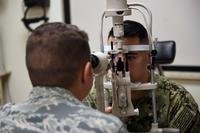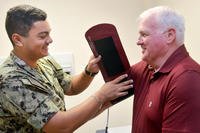Source: The American Legion - Teams of experts from The American Legion’s national staff have been working with several Department of Veterans Affairs regional offices (VAROs) since last December, identifying best practices for generating and processing fully developed claims (FDCs). The Legion has also provided more FDC training to its service officers. FDCs require no further documentation from veterans submitting the claims. As a result, decisions are made on them much faster than for traditional claims that need more development. While the current average processing time for traditional claims to be decided is about 260 days (which contributes to the backlog), the average for FDCs is about 114 days. The percentage of FDCs being submitted by American Legion service officers has increased at all seven VAROs the Legion teams visited: Pittsburgh, Baltimore, Nashville, Indianapolis, Denver, Oakland, Calif.; and Togus, Maine. Several increases show substantial improvement from fiscal 2013’s first quarter to the end of its third quarter in June. For the third quarter, nearly 36 percent of Legion-submitted disability claims at the Pittsburgh VARO were FDCs, up from only 2.6 percent during the first quarter. At the Oakland VARO, the percentage rose from about 24 percent to more than 40 percent in the same time period. The Togus VARO also saw a substantial percentage increase, from about two-and-a-half percent to more than 34 percent. "These increased percentages tell us that our FDC training has been effective, and that this is the beginning of a trend that will produce more and more fully developed claims," said Verna Jones, director of the Legion’s Veterans Affairs & Rehabilitation Division. "More FDCs mean three important things: a much faster adjudication process, faster delivery of benefits to our veterans, and keeping those claims out of the backlog." Peter Gaytan, executive director of The American Legion, said the White House asked the Legion last year to take a leading role in its FDC program because of the organization’s long experience in developing benefits claims and its network of more than 2,600 accredited representatives nationwide. In addition to the VARO site visits, American Legion service officers also received FDC training last February at their annual Department Service Officers School in Washington. Other FDC training sessions have taken place in New Orleans, Minneapolis, Montgomery, Ala., and Lansing, Mich. Another training session is scheduled for next month at the Legion’s national headquarters in Indianapolis. "The more FDCs we submit for adjudication by VA, the greater contribution The American Legion makes in helping to safeguard against a future claims backlog," Jones said. About 515,000 VA claims are currently backlogged, a 15-percent reduction since March. VA Secretary Eric Shinseki, who has called the backlog "the reason I agreed to continue my service as secretary," has vowed to eliminate it by 2015. Last month, Shinseki became the longest-serving VA secretary in U.S. history.
© Copyright 2024 Military.com. All rights reserved. This article may not be republished, rebroadcast, rewritten or otherwise distributed without written permission. To reprint or license this article or any content from Military.com, please submit your request here.



